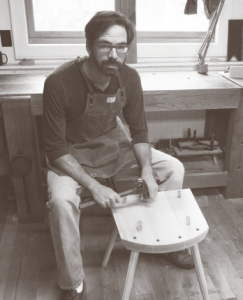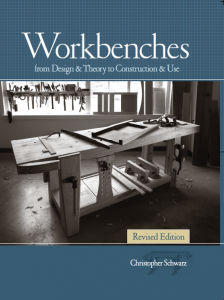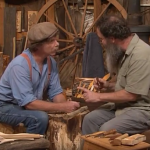We may receive a commission when you use our affiliate links. However, this does not impact our recommendations.
 You guys might know Christopher Schwarz. You know … he used to be the editor of our magazine, he’s a contributing editor and a regular blogger. Chris is a pretty busy guy what with all of that stuff and his own publishing company Lost Art Press, not to mention time spent in the woodshop. A revised edition of his book, “Workbenches: From Design & Theory to Construction & Use,” will be published in October 2015 (available at shop woodworking.com, lostartpress.com and from select partners), and he will be teaching at Woodworking in America next week. Chris was kind enough to take a few moments from his busy schedule to chat about all the things he has going on and his unwavering mission.
You guys might know Christopher Schwarz. You know … he used to be the editor of our magazine, he’s a contributing editor and a regular blogger. Chris is a pretty busy guy what with all of that stuff and his own publishing company Lost Art Press, not to mention time spent in the woodshop. A revised edition of his book, “Workbenches: From Design & Theory to Construction & Use,” will be published in October 2015 (available at shop woodworking.com, lostartpress.com and from select partners), and he will be teaching at Woodworking in America next week. Chris was kind enough to take a few moments from his busy schedule to chat about all the things he has going on and his unwavering mission.
Your mission has never really changed. It seems like from your days at PW to the core idea behind Lost Art Press, your focus has remained on helping woodworkers learn about hand tools and traditional techniques. From your point of view, how would you say your thoughts on the subject have evolved?
I think the only thing that has changed for me during the last 19 years is that I’m overwhelmed by the amount of “lost” material out there – information on tools, techniques and joinery that makes handwork simpler, faster and tighter.
A lot of that is due to the Internet. When I started researching old woodworking stuff, I checked out every old book on the topic I could find from the library. Then I looked at the references they cited. And then went back to those sources. It was slow and laborious. And many of the books and journals were so similar because they themselves didn’t have many sources to draw from.
With the Internet, we can peer into libraries worldwide and access woodworking information that has been buried for centuries.
So what seemed like a do-able exploration of the old literature of woodworking has turned into a mountain of projects that would take several lifetimes to complete.
I guess I have job security.
Is there anything you wish you could help woodworkers understand early on that took you a long time to discover?
The biggest obstacle today is that there is too much information out there – it’s the opposite of when I started as a boy. I see so many students who are paralyzed by the sometimes-conflicting advice they find on the Internet, in magazines and books. They only way to sort it out is to stop reading and pick up the tools. Stop asking questions and start making shavings. Stop drafting plans and start building furniture.
Many of your questions will answer themselves.
What are you working on these days?
I’m working on a book that is the companion to “The Anarchist’s Tool Chest,” which we published five years ago. Since that book came out I’ve been researching a type of furniture that has remained unchanged for 500 years and has had little written about it. It also uses different (much simpler) construction techniques than modern joinery.
And, here’s the kicker, the stuff looks very fresh and contemporary.
The goal with this book is to show woodworkers how they can build a houseful of really well-made and well-designed furniture with just a few tools and simple machines.
Oh, and it’s also a condemnation of the high styles of furniture that our societry treasures so much. I should get a lot of angry letters because of it.
 You recently put together a revision to your Workbenches book, which will be published in a new edition in October. Would you mind talking about what all you’ve added?
You recently put together a revision to your Workbenches book, which will be published in a new edition in October. Would you mind talking about what all you’ve added?
I’ve revised all of the chapters to reflect how things have changed in the last nine years – we now have more vises and workholding options than we did in 2007, which was when the first edition came out. And we added a couple variants to the bench plans. We added an old-school full-on 18th-century French bench, and an English-style bench that can be knocked down in about 10 minutes.
We tricked/coerced/asked Louis Bois to do the same fantastic style of drawings that he did for the first edition. All in all, I’m quite pleased with the way it came out.
What are you looking forward to most at WIA?
Besides the barbeque at Arthur Bryant? Mostly seeing all the people I didn’t get to see because I missed last year’s event.
We’ll have a booth in the Marketplace, so please do stop by and say hello if you can.
 Don’t miss Christopher Schwarz at Woodworking In America, September 25-27, 2015. Click to learn more about WIA.
Don’t miss Christopher Schwarz at Woodworking In America, September 25-27, 2015. Click to learn more about WIA.
Here are some supplies and tools we find essential in our everyday work around the shop. We may receive a commission from sales referred by our links; however, we have carefully selected these products for their usefulness and quality.









http://www.arthurbryantsbbq.com/